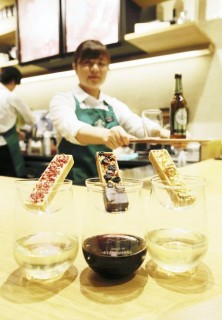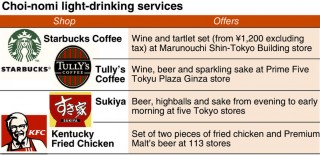Loading
Search
▼ Light Drinking Trend Proves Popular with Younger Crowd / Cafes, Food Chains Add Beers, Wines to Affordable Meal Sets
- Category:Cafe
Choi-nomi refers to light drinking at family restaurants and other casual dining establishments. Coffee chains and fast food outlets are joining the trend as younger generations become the main patrons of the service, which allows them to enjoy drinks as part of affordable food sets for ¥1,000 or so.
Starbucks Coffee Japan, Ltd. started a Starbucks Evenings service at the end of March at its Marunouchi Shin-Tokyo Building outlet in Chiyoda Ward, Tokyo. Its signature menu item is a glass of wine and tartlet set, starting at ¥1,200 excluding tax.
The service mainly targets working women in their 30s and 40s. The sweets are colorful, low calorie and designed not to get customers’ hands messy.
The wine glasses were designed in collaboration with Shotoku Glass Co. in Tokyo, known for its thin glassware, in a size easy for women to hold, according to Starbucks.
The coffee shop chain operator launched Starbucks Evenings in Japan following the United States and Britain. By offering alcoholic beverages, the company aims to lure in more customers during the evening and later.
A second Japanese outlet in Tokyo started Starbucks Evenings at the end of May, and the service will become available at more stores in business districts around the nation from the next fiscal year onward.
At the end of March, Tully’s Coffee Japan Co. opened Prime Five Tokyu Plaza Ginza in Chuo Ward, Tokyo, as a flagship store serving wine, beer and other alcoholic drinks. While primarily targeting women and businesspeople, the store also provides sparkling sake because the area has many foreign tourists. The outlet also offers about 20 different drinking snacks featuring Japanese ingredients.
Starbucks Coffee Japan, Ltd. started a Starbucks Evenings service at the end of March at its Marunouchi Shin-Tokyo Building outlet in Chiyoda Ward, Tokyo. Its signature menu item is a glass of wine and tartlet set, starting at ¥1,200 excluding tax.
The service mainly targets working women in their 30s and 40s. The sweets are colorful, low calorie and designed not to get customers’ hands messy.
The wine glasses were designed in collaboration with Shotoku Glass Co. in Tokyo, known for its thin glassware, in a size easy for women to hold, according to Starbucks.
The coffee shop chain operator launched Starbucks Evenings in Japan following the United States and Britain. By offering alcoholic beverages, the company aims to lure in more customers during the evening and later.
A second Japanese outlet in Tokyo started Starbucks Evenings at the end of May, and the service will become available at more stores in business districts around the nation from the next fiscal year onward.
At the end of March, Tully’s Coffee Japan Co. opened Prime Five Tokyu Plaza Ginza in Chuo Ward, Tokyo, as a flagship store serving wine, beer and other alcoholic drinks. While primarily targeting women and businesspeople, the store also provides sparkling sake because the area has many foreign tourists. The outlet also offers about 20 different drinking snacks featuring Japanese ingredients.
Adding a drink
Zensho Holdings Co., whose arms include the operator of the Sukiya gyudon beef bowl store chain, offers a nomi-suki service at five outlets in Tokyo from the evening through to 5 a.m., during which beer, highballs and snacks are available.
The service’s biggest advantage is its “affordable price at less than ¥1,000 including tax, even when you order a gyudon, a drink and a side dish, along with the convenience of having a drink with your meal,” according to an official of the company’s sales strategy division. For example, a set of beef bowl, pickles and miso soup with pork along with a glass of Asahi Super Dry beer and three pieces of kara-age fried chicken totals just ¥900.
The service is helping the chain develop a new customer base. “We have more female customers in their 20s and 30s since we started nomi-suki,” said the manager of a Sukiya outlet in Minato Ward, Tokyo.
Even some Kentucky Fried Chicken outlets have been serving beer in a limited summertime deal since last year. This year, 113 KFC shops in central Tokyo and near train stations are serving a set of two pieces of chicken along with a glass of Suntory The Premium Malt’s for ¥840 through the end of September. These outlets also allow customers to drink beer from 2 p.m. if they pay an extra ¥120 to substitute beer for the any regular set menu.
Financial hardship a factor
Yohei Harada, a researcher at Hakuhodo Inc.’s Youth Life Lab, pointed out that light drinking services are often used by working men and women in their 20s and 30s.
“They are distinctive in that even though they drink alcohol, they don’t get dead drunk or drink too much, but tend to enjoy it in small quantities,” the youth culture expert said.
According to a report released this spring by the National Tax Agency, just 16 percent of men and 7 percent of women in their 20s consume alcohol at least three days a week, while the figures increase to 46 percent for men and 22 percent for women in their 40s, and 55 percent for men and 21 percent for women in their 50s.
Harada also pointed out that there is an economic change behind the choi-nomi trend. “A fundamental factor is that many people in younger generations face economic difficulties, mainly because they work non-regular jobs,” he said.
[By Wakako Takeuchi / Yomiuri Shimbun Staff Writer
- July 2, 2016
- Comment (0)
- Trackback(0)



